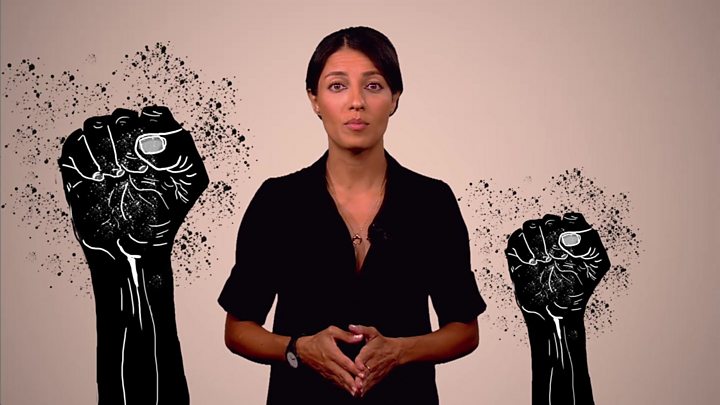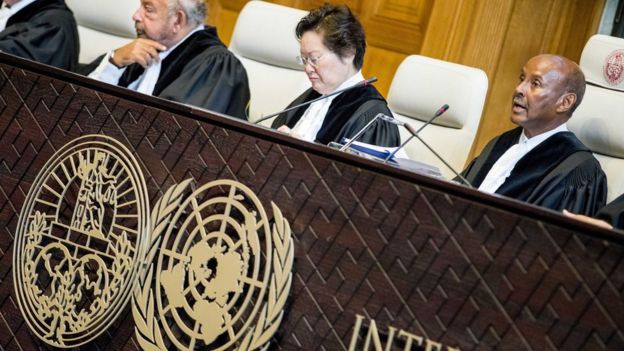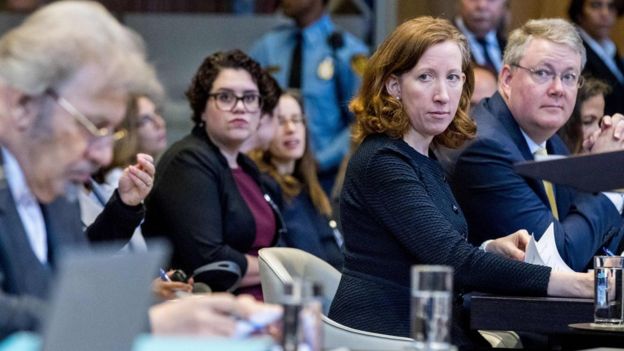Iran urges UN court to halt US reimposed nuclear sanctions

Iran has asked the International Court of Justice (ICJ) to lift the sanctions imposed by the US after it abandoned the deal on Tehran's nuclear programme.
Iranian lawyer Mohsen Mohebi said the US aimed to damage Iran's economy "as severely as possible" and had violated a little-known 1955 friendship treaty.
The US is expected to argue that the sanctions do not breach the treaty.
Iran's economy has slumped since US President Donald Trump ordered that the sanctions be reinstated in May.
The Iranian currency, the rial, has lost half its value against the dollar, the monthly inflation rate has risen to 10.2%, and unemployment stands at 12.5%.
On Sunday, Iran's parliament voted to dismiss Finance Minister Masoud Karbasian over his failure to address the country's economic woes.
- The impact of Iran sanctions - in charts
- Could the Iran deal collapse?
- Does US 'Plan B' on Iran risk war?
Why did the US abandon the nuclear deal?
The 2015 accord between six world powers and Iran saw the Islamic Republic limit its controversial nuclear activities in return for relief from international sanctions.
But Mr Trump said the deal "failed to achieve the fundamental objective of blocking all paths to an Iranian nuclear bomb" and did not deal with Tehran's "malign activities, including its ballistic missile programme and its support for terrorism".
 EPA
EPA
In an attempt to compel Iran to agree to a new accord the president reinstated sanctions earlier this month that targeted the Iranian government's purchase of US dollars, Iran's trade in gold and other precious metals, and its automotive sector.
In November, a second batch of potentially more damaging sanctions will be reimposed on Iran's oil and shipping sectors as well as its central bank.
The other parties to the deal - the UK, France, Germany, China and Russia - have criticised Mr Trump's decision and pledged to abide by their commitments under the existing deal. But many major firms have already pulled out of Iran.
What is Iran arguing at the ICJ?
The ICJ is the principal judicial organ of the United Nations and settles legal disputes between member states.
Last month, Iranian lawyers filed a case before the court that called on its judges to order the US to suspend its sanctions pending a definitive ruling - something that could take years.
The lawyers argued that the sanctions violated the 1955 Treaty of Amity, Economic Relations, and Consular Rights between Iran and the US, which grants the ICJ jurisdiction over disputes.
They also said the reasons cited by President Trump for reimposing the sanctions were unfounded because the International Atomic Energy Agency (IAEA) had repeatedly confirmed that Iran was complying with the terms of the nuclear deal.
"The US is publicly propagating a policy intended to damage as severely as possible Iran's economy and Iranian national companies, and therefore inevitably Iranian nationals," Mr Mohebi told the court on Monday.
"This policy is nothing but naked economic aggression against my country."
How has the US responded?
The US has vowed to "vigorously defend" itself against Iran's "baseless" lawsuit.
It is expected to argue on Tuesday that the ICJ should not have jurisdiction in the dispute, and that Iran's assertions fall outside the bounds of the treaty.
 AFP
AFP
The ICJ has ruled previously that the treaty is valid even though it was signed before the 1979 Islamic Revolution in Iran, which saw the US-backed Shah overthrown and heralded four decades of hostility between the two countries.
The oral hearings will last for four days and a decision on Iran's request for a provisional injunction is expected within a month.
Although the ICJ's rulings are binding, it has no power to enforce them.

No comments:
Post a Comment